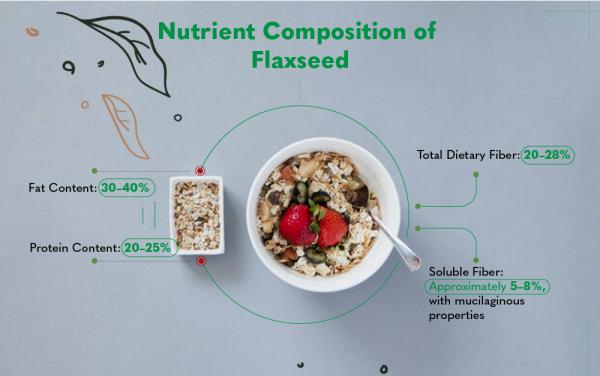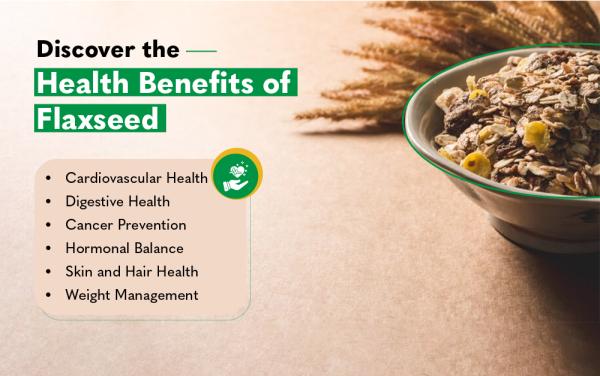Flaxseed, often touted as a superfood, has gained popularity in recent years due to its impressive array of health benefits. Derived from the flax plant (Linum usitatissimum), flaxseed has been cultivated for centuries for its nutritional and medicinal properties. Today, its versatility and rich nutrient profile have made it a staple in the diets of health-conscious individuals worldwide.
Understanding Flaxseed: Nutritional Profile, Health Benefits, and Uses
Flaxseed is celebrated for its abundant reserves of omega-3 fatty acids, fiber, and lignans, which collectively promote its significant health benefits. Available in two primary varieties—brown and golden—brown flaxseed is more extensively researched and commonly found in markets.
Nutritional Breakdown
Chemical analysis reveals that flaxseed typically comprises 30–40% fat, 20–25% protein, and 20–28% total dietary fiber. Additionally, it contains essential vitamins (A, B, D, and E), minerals, and amino acids. Variations in flaxseed composition can occur due to factors such as genetic differences, growth conditions, processing methods, and analytical techniques. Generally, as oil content increases, protein content decreases. Flaxseed also contains about 5–8% soluble fiber with mucilaginous properties, imparting a high water-holding capacity akin to gum arabic.
Storage and Quality
Flaxseed maintains quality for over 12 months when stored with approximately 9–10% water content. Excessive moisture and heat can degrade its quality, leading to internal or external discoloration and a musty odor.
Functional Properties
Beyond its nutritional richness, flaxseed exhibits functional properties beneficial in various applications. Its soluble fiber contributes to texture and moisture retention in food products, similar to gum arabic, enhancing their quality and shelf life.
Understanding these nutritional and functional aspects underscores flaxseed's versatility and value, making it a desirable addition to both culinary and health-conscious practices.
Nutritional Composition
One of the key reasons behind flaxseed's health benefits lies in its impressive nutritional profile. A typical serving of flaxseed (about 1 tablespoon, ground) contains:
Omega-3 fatty acids: Essential for heart health, brain function, and reducing inflammation.
Dietary fiber: Facilitates digestion, regulates blood sugar levels, and supports gut health.
Lignans: Plant compounds with antioxidant properties, potentially aiding in cancer prevention and hormonal balance.
Proteins and essential amino acids: Building blocks for tissues and muscles.
Comprehensive Health Benefits of Flaxseed: A Nutritional Powerhouse
1. Cardiovascular Health
Flaxseed's high omega-3 content, particularly alpha-linolenic acid (ALA), is pivotal in promoting cardiovascular health by lowering blood pressure, reducing cholesterol levels, and decreasing coronary artery disease risk. Studies highlight that regular flaxseed consumption enhances overall heart function and cardiovascular well-being. Flaxseed, comprising 35% oil with 55% ALA, and flax meal, rich in lignan secoisolariciresinol diglucoside (SDG), significantly inhibit hypercholesterolemic atherosclerosis development in rabbits. In experimental models, flaxseed, flax lignan complex (FLC), and SDG demonstrate reductions of 46%, 73%, and 34%, respectively, in atherosclerosis progression, though FLC and SDG do not regress existing conditions. These findings suggest that flaxseed's lignan content, rather than ALA, primarily contributes to its atherosclerosis-suppressing effects, underscoring its multifaceted cardiovascular benefits.
2. Digestive Health
Flaxseed's fiber content, comprising both soluble and insoluble fibers, plays a pivotal role in digestive health. Soluble fiber forms a gel-such substance in the gut, aiding in cholesterol management and blood sugar regulation. This helps maintain healthy cholesterol levels and stabilize blood glucose, which is crucial for diabetes management. Additionally, the insoluble fiber in flaxseed promotes regular bowel movements, preventing constipation and enhancing overall digestive function. By incorporating flaxseed into your diet, such as adding it to yogurt, smoothies, or baked goods, you can easily benefit from its digestive health-promoting properties.
3. Cancer Prevention
Lignans found in flaxseed possess potent antioxidant properties, crucial for neutralizing free radicals and potentially lowering cancer risk. Research indicates that flaxseed consumption correlates with reduced incidences of breast, prostate, and colon cancers. Studies demonstrate significant effects in animal models, where flaxseed lignans reduced mammary tumor size by over 50% and tumor numbers by 37% in carcinogen-treated rats. Human studies show that daily ingestion of 10 grams of flaxseed induces hormonal changes linked to decreased breast cancer risk. Flavonoids such as herbacetin 3,7-O-dimethyl ether and herbacetin contribute to flaxseed's antioxidant activity, enhancing its potential as a chemopreventive agent. Epidemiological data further supports these findings, revealing lower breast cancer rates in vegetarian populations and lower lignan concentrations in omnivores and women with breast cancer. Flaxseed emerges as a promising dietary supplement in cancer prevention strategies.
4. Hormonal Balance
Flaxseed contains lignans, which are phytoestrogens that mimic estrogen's effects. This feature proves beneficial, especially for women undergoing menopause. It can alleviate symptoms such as hot flashes and mood swings by providing a natural estrogenic effect. Moreover, flaxseed aids in regulating menstrual cycles, benefiting women's hormonal balance. Importantly, these lignans also contribute to hormonal equilibrium in men, showcasing broader applicability beyond menopausal relief. Overall, flaxseed's phytoestrogenic properties offer a natural remedy for hormonal support in both genders, addressing diverse health needs from menopausal discomfort to general hormone regulation.
5. Diabetes Management
Flaxseed provides substantial benefits for individuals with or at risk of diabetes. Its soluble fiber content slows sugar release into the bloodstream, stabilizing glucose levels and enhancing insulin sensitivity. Research indicates that flaxseed can lower blood sugar levels and may amplify the effects of diabetes medications. In India, where nearly 62 million people have diabetes, and projections suggest a rising trend, flaxseed's role in managing diabetes becomes crucial. The country's increasing rates of obesity contribute significantly to diabetes risk. As omega-3 fatty acids become scarce in modern diets and omega-6 intake rises, flaxseed offers a valuable source of these essential nutrients. However, individuals with diabetes should monitor their blood sugar closely when incorporating flaxseed due to potential hypoglycemic effects.
6. Skin and Hair Health
Omega-3 fatty acids found in flaxseed play a crucial role in maintaining skin and hair health. These essential fats are pivotal in keeping the skin hydrated, reducing inflammation linked to conditions such as acne and eczema, and promoting a smoother complexion. Moreover, flaxseed's anti-inflammatory properties extend to scalp health, potentially enhancing hair strength and shine. By incorporating flaxseed into one's diet, individuals may benefit from its ability to nourish the skin from within, alleviate skin conditions, and support overall hair vitality. This natural source of omega-3s offers a holistic approach to skincare and hair care, harnessing the power of nutrition for lasting beauty benefits.
7. Weight Management
Incorporating flaxseed into a balanced diet can assist in weight management through its unique nutritional profile. Rich in fiber, healthy fats, and protein, flaxseed promotes feelings of fullness and satiety, curbing calorie consumption. Additionally, its high fiber content supports digestive health, promoting regular bowel movements essential for maintaining a healthy weight. By providing a combination of nutrients that support appetite control and digestive function, flaxseed becomes a valuable addition to dietary strategies aimed at achieving and sustaining weight management goals.
Discover the latest insights and market trends in flaxseed health benefits with Data Bridge Market Research. Explore now to unlock valuable data and strategic opportunities.
https://www.databridgemarketresearch.com/reports/global-flaxseeds-market
Health Issues Addressed by Flaxseed
Flaxseed's multifaceted nutritional profile and bioactive compounds make it beneficial for addressing various health issues, including:
- High cholesterol: Regular consumption of flaxseed can help lower LDL cholesterol levels and improve overall lipid profiles
- High blood pressure: Omega-3 fatty acids in flaxseed contribute to cardiovascular health by reducing blood pressure and promoting artery health
- Inflammation: Lignans and omega-3s possess anti-inflammatory properties that may help alleviate symptoms associated with inflammatory conditions such as arthritis and asthma
- Menopausal symptoms: The phytoestrogenic properties of flaxseed lignans can mitigate hot flashes and other menopausal discomforts
- Digestive disorders: The fiber content in flaxseed supports digestive health, aiding in conditions such as constipation and diverticulitis
Incorporating Flaxseed into Your Diet: Delicious and Nutritious Ideas
1. Ground Flaxseed
Ground flaxseed is a versatile addition to your diet, offering a nutty flavor and a nutritional boost. Sprinkle it into:
Smoothies: Blend with fruits, yogurt, and a liquid of your choice for a creamy texture and added fiber.
Yogurt: Stir into yogurt for a crunchy texture and enhanced omega-3 content.
Oatmeal: Mix into your morning oats to increase fiber and provide a subtle nutty taste.
Baked Goods: Incorporate into muffins, pancakes, or bread for added nutrients without altering the taste significantly.
2. Flaxseed Oil
Flaxseed oil is rich in omega-3 fatty acids and can be used in various culinary ways:
Salad Dressing: Whisk with vinegar or lemon juice for a flavorful dressing that promotes heart health.
Cooked Vegetables: Drizzle over steamed or roasted vegetables to enhance flavor and retain nutritional benefits.
Explore the latest flaxseed oil market trends with Data Bridge Market Research. Gain valuable insights for informed decisions and strategic planning. Dive in now for actionable data!
https://www.databridgemarketresearch.com/reports/global-flaxseed-oil-market
3. Flaxseed Meal
Flaxseed meal, a grounded version of flaxseed, is an excellent flour substitute:
Baking: Replace a portion of flour in recipes for cookies, muffins, or bread to increase fiber and nutrient content while adding a pleasant, slightly nutty flavor.
Incorporating flaxseed into your daily meals is simple and offers numerous health benefits, from improving heart health to enhancing digestive function. Experiment with these ideas to enjoy the nutritional advantages of flaxseed effortlessly.
Conclusion: Embracing Flaxseed for Health and Wellness
Flaxseed is celebrated for its exceptional nutritional profile, boasting high levels of omega-3 fatty acids, fiber, and lignans. These components contribute significantly to its array of health benefits, spanning from cardiovascular support and improved digestion to potential cancer prevention and hormonal regulation. By integrating flaxseed into your daily diet, you can effortlessly boost your overall well-being and adopt a healthier lifestyle.
Including flaxseed in various forms—such as ground seeds in smoothies or yogurt, flaxseed oil in salads, or flaxseed meal in baked goods—provides a simple yet potent way to harness its nutritional power. Omega-3 fatty acids aid in maintaining heart health and reducing inflammation, while fiber supports digestive regularity and stabilizes blood sugar levels. Lignans, with their antioxidant properties, offer potential protection against cancer and contribute to hormonal balance.
Flaxseed's versatility makes it a valuable addition to any diet, offering not only nutritional benefits but also practicality in enhancing everyday meals. Embracing flaxseed means embracing a natural, nutrient-rich superfood that has the potential to positively impact your health and well-being in numerous ways.











